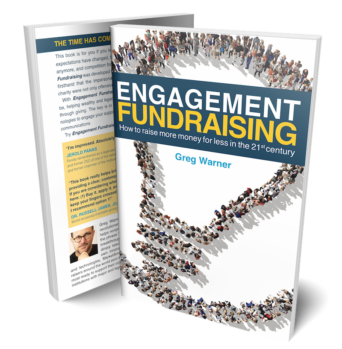We use cookies to ensure that we give you the best experience on our website. By continuing to use this site, you agree to our use of cookies in accordance with our Privacy Policy.
 Login
Login
Your Role
Challenges You Face
results
Learn
Resources
Company
Finally! “The Effortless Ask” – Using the Donor’s Story to Make It Easy to Ask Big in 3 Easy Steps


The Ask.
Fundraisers think about it. Conference speakers talk about it. Books get written about it.
But is it worth all the hype? Is ‘The Ask’ so monumental to deserve capital letters when referring to it?
What’s really going on here is that one component of the fundraising process has been elevated and overhyped by fundraising consultants making it seem much more grandiose than it is. And that’s not to say The Ask isn’t important.
But the intimidation and apprehension felt by some gift officers when the time comes to actually ask a major donor for a big gift is really just a symptom of a deeper problem. All the hype around The Ask comes from a misunderstanding of the rest of the fundraising process. And if you do all the other steps well, The Ask is frankly pretty simple. You’ll see why in this article.
Here’s the main point:
Major gifts fundraising is most effective when using a donor-centric, donor-story-based approach. When you do that, The Ask arrives at the point in the story where it belongs, and it happens almost organically.
This is the approach championed by Dr. Russell James, a research specialist in major and planned giving. Dr. James was named to the National Association of Charitable Gift Planners Hall of Fame for his lifetime of research. So, he knows a few things.
And that’s why we partnered with Dr. James to turn his research into an industry-upending fundraising eCourse called Donor Story: Epic Fundraising. When you and your team take this course, you will upgrade your major gift fundraising to win more and bigger gifts.
So, let’s see what Dr. James has to say about The Ask.
What The Ask Is Not
The Ask is not a solitary, isolated, one-time event removed from the rest of major gifts fundraising. It is not a separate step in the process that requires a whole new set of skills. It is not distinct from everything else you do as a gift officer.
What The Ask Is
The Ask is merely one more step in the process. In the story-based terminology of Dr. James, The Ask is simply one episode in the donor’s story.
In this terminology, Dr. James refers to The Ask as The Challenge.
He does this because, in all great stories and myths, there comes a moment when the hero is faced with a challenge. This challenge upends life as the hero has known it. And it does this because it calls out the hero’s original and true identity, and links that to the challenge presented before them.
The most classic picture of this comes from Star Wars when Obi-Wan challenges Luke to come with him to help Princess Leia. Luke’s identity is wrapped up with the Force, the Jedi, his father, and all the rest, but up to this point, it has been latent within him, dormant, inactive. But it’s there. When the challenge is presented, he rejects it the first time (sound familiar?). But, when his circumstances change, he accepts it immediately, because deep down, he knew he was meant to do this.
A donor’s story is no different in principle.
The Ask challenges the donor to do something risky, profound, beyond their normal routine, and that will change the course of history. That’s what big gifts are supposed to feel like. But it’s challenging them in an area deeply linked to their identity.
The Ask is the moment in the donor’s story when they link their original identity with the promise of victory that comes through making a major gift.
The donor’s identity refers to their life history, their values, and people who have influenced them. It’s what they care about. The promise of victory must be something the donor – the hero of the story – can visualize. It must be specific.
When you set up the story by putting these elements in place, the donor will experience the thrill of victory when they rise up to meet the challenge and make a major gift. Giving will now enhance their identity either through external recognition and reputation, an internal sense of value and meaning, or both.
How The Ask Looks
An effective Ask is personalized to each donor’s life story.
It is built upon their identity, values, desires, interests, people in their story, connections they’ve made, things they’ve learned, and all the rest. Their identity is what powers their true reasons for giving.
When you make The Ask, it must verify and connect to the donor’s life story. You’re asking based on what you have learned about this donor, what drives them, what moves them emotionally, what angers them, what inspires them. All of this can be collected through MarketSmart’s tech-enabled donor discovery and cultivation system and through your one-to-one engagements.
And, The Ask must deliver the value the donor is seeking.
What do they want to experience through their gift? What do they want to feel?
That’s why an effective Ask will be personalized – because you may be proposing not just a dollar amount but a means of giving as well. People want to give wisely!
It may be stock options, a retirement account, a home, or a business sale. It could be a permanent endowment – a means of immortality. Whatever it is, you will have already discussed these prior to making the challenge. So you will be asking, knowing that what you’re challenging them to do is something that deep down, they want to do.
And, you may be proposing that they give to something specific, such as a new fundraising campaign, a capital project, a new scholarship, a program expansion, or something else that means something to the donor.
The Ask must be specific and able to be visualized. It must have personal meaning to the donor because it connects to their original identity.
Are You Ready to Make The Ask?
If you and they are ready, making The Ask will feel like the next natural step.
You won’t feel this pit in your stomach:
“Wow, we’ve been talking for several months, and it’s been great, but now I have to ask them for money!?”
You won’t feel that trepidation if you’re asking at the right time. If it feels awkward to make The Ask, this means you’re probably missing something. You haven’t yet created the conditions in the donor’s mind and heart where it will be effortless and straightforward to challenge them to make a gift.
Just like you don’t know what’s going on when you come into the middle of a movie, making the Ask before the donor’s story has reached the right moment feels awkward.
The 3 Steps to The Ask
When the donor’s story has reached the point where it is the next natural step to ask for a gift, Dr. James lays out three steps for doing this.
- Make a statement connecting the donor’s identity to the challenge
- Make a statement connecting their victory to their identity
- Make a statement connecting the challenge to their victory
With just three sentences, you can bring together the donor’s identity, the victory they want to experience, and the challenge you’ll be putting before them.
You can expand on these three to make them more like paragraphs if it’s appropriate for a particular donor, but your Ask will comprise just these three elements.
And after you’ve made the challenge, sit and wait in silence. Don’t interrupt their thought process, and don’t let your team interrupt. Tell them beforehand to zip it once The Ask has been made.
Why?
Because the supporter is thinking. You have made a big challenge – bigger than they were probably expecting. It will cost them something. This is the climactic moment in this part of their life story. Are they going to rise up to the challenge? Are they going to seize the day?
Let them dwell on this until they respond.
Dr. James says, “Effective fundraising uses the identity-challenge-victory cycle over and over.”
The idea is, you will have prodded the donor a little bit at a time over many conversations using these three components. Uncovering more of their identity. Motives. Driving forces. Interests. Passions. Dreams. Wanting to do something great with their life. The victory they want, and why it matters. How it looks. The picture in their minds.
You’ll be hitting on these over and over and over, getting more specific each time.
Then, when you make The Ask, you get more specific than you ever have before:
Here’s a number. Here’s a method. Here’s what will happen after you make this gift. Do you want to do it?
Examples of The Ask Using the Story-Based Approach
In the Donor Story: Epic Fundraising eCourse, you will see many more examples of this from Dr. James’ research and writings.
But here are a couple ways this 3-step Ask sequence might look. Again – notice how simple these are. They are simple because of all the work that has come before. When you’ve set up this moment, it may not take very much time at all, depending on how they respond.
Example 1: Cancer Research Ask
Identity to Challenge sentence:
“You have done so much to improve care for others since your own diagnosis with breast cancer.”
Victory to Identity sentence:
“You understand how lives could be changed by offering free early screening.”
Challenge to Victory sentence:
“Would you consider a gift of $100,000 to help fund next year’s screening clinics?”
Do you see the donor’s identity in the first two statements? This person battled cancer in their own life, and they used that experience to help improve medical care for others going through something similar. They have a personal stake in helping people battling cancer. It matters to them.
A lot of conversation had to happen before you could make that statement, and know how much it would resonate with them. “You have done so much,” for example. Before The Ask, you’ve discussed all those things with them. You know their story after their diagnosis.
And the second statement brings in the victory, because this person benefitted from early screening (or they didn’t catch it in time, but they don’t want others to suffer their experience). Helping others steer clear of cancer via early screening is a victory they greatly desire. It’s linked to their identity as a cancer survivor.
And the final statement reveals the challenge again – linking the dollar amount to the victory they desire and can visualize.
Very simple. But only effective when delivered at the right moment in the donor’s story.
Here’s another example:
Example 2 – College Fundraising Ask
Identity to Challenge sentence:
“You have been such a loyal alumnus of this department since you graduated years ago.”
Victory to Identity sentence:
“You understand how important scholarships are in giving students the chance for an education.”
Challenge to Victory sentence:
“Would you consider a gift of $100,000 to fund a permanent named scholarship to help others like you become proud alums in the future?”
Related Resources:
- The Truth about Wealthy People and Philanthropy Should Affect Your Fundraising… But Does It?
- 4 Ways Your Assumptions about Major Donors Are Hurting Your Fundraising
- The 3 Key Elements of a Good Fundraising Story
- 10 Questions You Should Ask Your Wealthy Supporters to Motivate them to Give
LIKE THIS BLOG POST? SHARE IT AND/OR LEAVE YOUR COMMENTS BELOW!
Get smarter with the SmartIdeas blog
Subscribe to our blog today and get actionable fundraising ideas delivered straight to your inbox!
